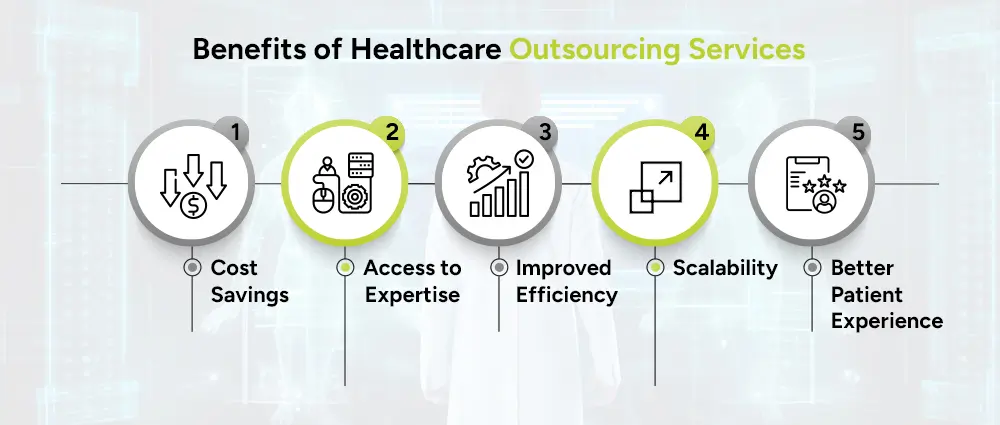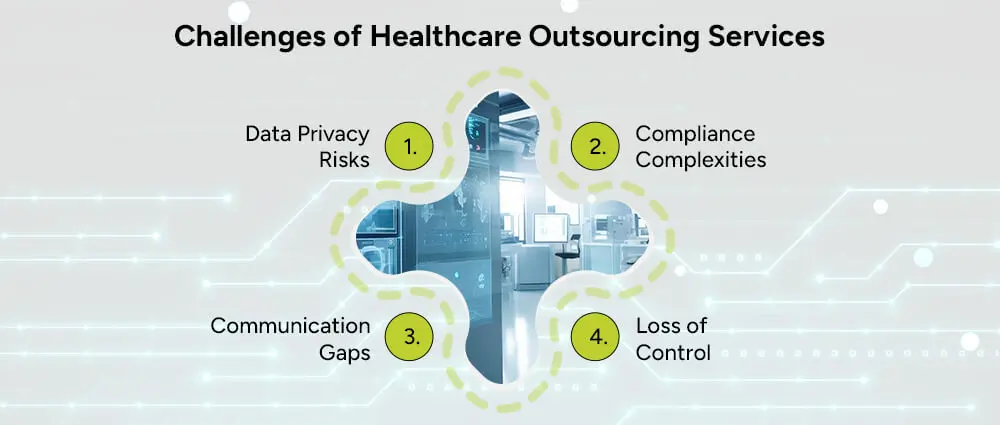All eyes are on the Middle East today. With all industries taking off in the right direction, the UAE’s healthcare sector is also similarly booming. With state-of-the-art hospitals, tech-driven clinics, and world-class patient care, it’s no surprise that the demand for healthcare outsourcing services is on the rise.
But what exactly does that mean? And is outsourcing in healthcare services really the way forward? Today, let’s break it down: the benefits, challenges, and smart solutions healthcare organizations are using.
In layman language, outsourcing in the case of healthcare services is those unique services that allow an organization to hire external agencies or other individuals to perform certain tasks in relation to healthcare.
Instead of doing everything by themselves, like billing, IT management, or development of patient portal software, or even patient support, healthcare providers would just go and get into partnership with the specialized companies.
Under the umbrella of a broader category called healthcare business process outsourcing services (or healthcare BPO), the practice transforms the modus operandi of hospitals and clinics today.
When we are seeing technology take flight in the Middle Eastern hub, there must be a number of reasons why. So, let’s discuss a few of them:
With new hospitals and clinics popping up across the UAE, managing everything in-house has become overwhelming. Outsourcing helps healthcare providers keep up with growing operational demands.
Doctors and nurses should spend their time healing people, not stuck in administrative tasks. Outsourcing lets medical teams stay focused on what truly matters, patient care.
Hiring and training full-time staff for every function is costly. Outsourcing cuts down these expenses, offering expert services at a fraction of the price.
Healthcare is going digital fast, think telehealth, digital records, and AI diagnostics. Outsourcing IT services in healthcare brings in the tech expertise needed to stay ahead without heavy in-house investments.

Let’s dive into why so many healthcare organizations are choosing to outsource:
Running an in-house team for billing, IT, or customer support is expensive. Outsourcing trims down staffing costs, infrastructure investments, and training expenses.
You get access to highly trained specialists without having to hire them full-time. This is especially valuable for technical areas like outsourcing IT services in healthcare.
Healthcare outsourcing companies specialize in what they do, meaning faster turnarounds, fewer errors, and smoother operations.
Need to ramp up quickly during a flu season? Outsourcing lets you scale up or down depending on your needs.
When you allow health workers to focus less on admin overload, the workers are able to pay more attention to the patients in the hospital. There are also many BPO providers that do customer support outsourcing, like 24/7 call center operations. Therefore, every healthcare facility can ensure their clients are always heard.

Of course, it’s not all smooth sailing. Let’s talk about the challenges of healthcare outsourcing services:
Healthcare data is sensitive. Handing it over to a third party can expose you to privacy breaches if not handled properly.
Different regulations like HIPAA, GDPR (especially with international outsourcing), and local UAE healthcare laws must be followed strictly.
Miscommunication can lead to confusions and errors in association with your outsourcing partners if they do not fit within the frameworks of your processes.
You are giving a part of your operations to another person when you outsource. Without the clear delineation of what is going on, this can cause some serious issues.
Here’s the good news, these challenges can be tackled with some smart moves:
Always go with trusted healthcare outsourcing companies that have proven experience. They’ll know the ins and outs of healthcare rules and patient data safety.
Make sure your outsourcing partner follows healthcare laws like HIPAA or local UAE regulations. Check for certifications and secure data handling practices.
Keep everyone on the same page with regular check-ins, updates, and shared dashboards. Good communication avoids confusion and keeps quality high.
Write down everything clearly in your agreements, from what tasks are expected to timelines and quality standards. This avoids surprises later.
When you take these steps, the pros and cons of outsourcing healthcare services tilt heavily in favor of the pros.
Still wondering how outsourcing looks in real life? Here are some examples of outsourcing in healthcare:
Medical Billing and Coding: Specialized companies handle billing, insurance claims, and coding.
Healthcare IT Support: Managing hospital software, cybersecurity, cloud storage, telehealth platforms, and enabling healthcare cloud migration.
Telemedicine Support: Setting up and managing remote patient care platforms.
Customer Service: Call centers that handle appointment scheduling, patient queries, and follow-ups.
Medical Transcription: Converting doctor notes into structured reports.
Outsourcing healthcare services, especially in the UAE’s fast-growing market, is no longer a luxury to have; it’s a smart business move to step forward with the competition. While challenges exist, they can be easily managed with the right partners and careful planning.
Whether you’re looking to save costs, improve efficiency, or deliver better patient experiences, Arpatech’s healthcare business process outsourcing services could be the perfect solution for your organization.
Just remember: outsourcing in healthcare services isn’t just about offloading work, it’s about finding the right partners who can help you serve your patients better, so leave us a message today!
Healthcare process outsourcing means hiring an external service provider to handle non-clinical but critical functions like billing, data entry, claims management, and medical practice IT support for healthcare providers.
Medical outsourcing focuses specifically on clinical-related activities, like telemedicine, remote diagnostics, lab testing, and even hiring specialized medical professionals from third-party vendors.
Healthcare organizations often outsource customer support for:
This helps in ensuring a consistent, reliable patient experience.
Rely Services, one of the prominent healthcare outsourcing companies, ensures compliance by:
Their approach ensures that sensitive healthcare data is handled with the highest standards of security and confidentiality.